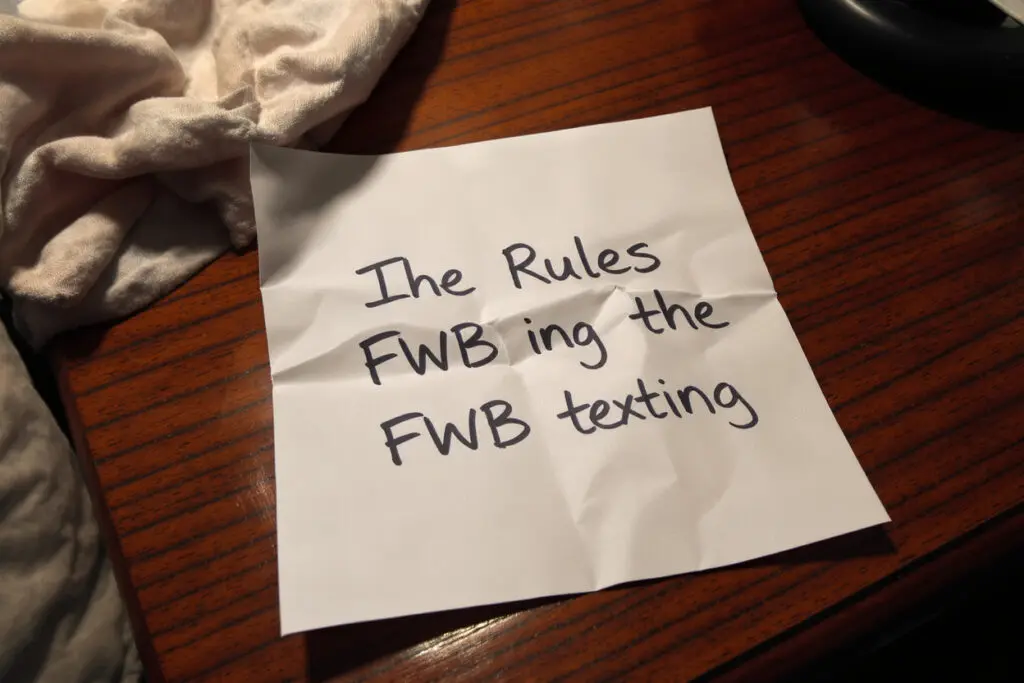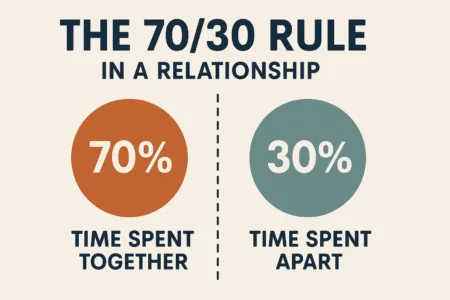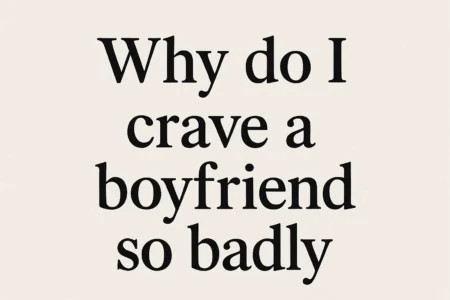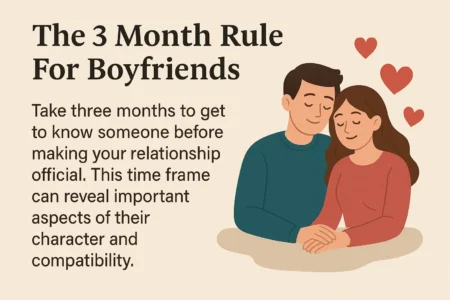Trying to manage a friends-with-benefits thing can seriously feel like walking a tightrope. You’ve got the comfort of a real friendship and the fun of intimacy on one side. But on the other? A messy, tangled web of unspoken rules, especially when your phone gets involved. All the buzzing and pinging can take a simple, fun dynamic and fill it with anxiety, fast. What does that 2 a.m. text really mean? Are we talking too much? Not enough?
That gray area is exactly where the fun dies and the confusion takes over. Getting a handle on the essential FWB texting rules isn’t about being a robot about it; it’s about building a framework that actually protects the friendship and keeps the “benefits” part fun for both of you. It all comes down to communication, clarity, and just keeping things simple.
More in Connection & Dating Category
Signs You Are an Intimidating Woman
Key Takeaways
- Set the Rules Early: Have a real talk about what you both expect from texting before things go too far. It’ll save you from so many headaches later.
- Stick to Logistics: Mostly, your texts should be about making plans. Keeping it functional is the easiest way to keep lines from blurring.
- Skip the Couple Tropes: Avoid the classic “good morning” and “good night” texts. That daily check-in stuff builds an emotional habit that doesn’t belong here.
- Be Straightforward: If a text feels weird or your own feelings are getting complicated, you have to say something. Honesty is the only thing that makes this kind of arrangement work.
- End It with Class: Don’t just disappear. A simple, kind text is a perfectly fine way to end an FWB situation with respect.
So, We’re Doing This… How Do We Even Start Texting?
That first phase of an FWB is always the most awkward. You’ve officially crossed a line and now you’re in this new territory with zero road signs. The single best thing you can do for the future of your arrangement is to have “The Talk” about how you’re going to communicate. It might feel a bit stiff, but believe me, it’s a total game-changer.
I still think my most successful FWB situation worked because we had a post-hookup chat over pizza. We both knew we didn’t want a relationship, so I just put it all out there. “Okay, so how are we going to do this?” I asked. “Are we ‘how’s your day’ people, or are we just ‘you up?’ people?”
He laughed, and I could tell he was relieved I brought it up. We decided right then that our texts would be for making plans, maybe with a funny meme thrown in here and there. We also agreed that if things started to feel weird for either of us, we’d say so. That one chat saved us from so much potential drama. It created a foundation of honesty that let us stay good friends long after the “benefits” had ended.
This first conversation is everything. It’s the blueprint for how you’ll interact. It’s your moment to set the tone. Is this strictly business? Are inside jokes cool? Is chatting all day long completely off the table? Getting these answers now means you won’t be up at 1 a.m. next month trying to decode a text. You’re setting yourselves up for a smooth ride from message number one.
It’s all about managing expectations.
Is a “Good Morning” Text a Cardinal Sin?
In the FWB world? Yes. It absolutely is. A “good morning” text is harmless when you’re in a committed relationship, but it carries a ton of weight here. It’s a simple little phrase, but it’s loaded with meaning.
Why does a simple greeting feel so complicated?
Just think about what “good morning” really says. It says, “You’re the first person I thought about today.” In a relationship, that’s beautiful. In an FWB situation, it’s a boundary violation. It’s couple behavior, and it suggests a level of day-to-day emotional connection that isn’t part of the deal. These tiny, innocent-seeming messages are how emotional attachment starts. They build a routine. They create an expectation. Before you know it, you’re not just friends who hook up; you’re two people who check in every single morning. That is how lines get blurred and people get hurt.
The same exact thing goes for the “good night” text. It means they’re on your mind before bed. Even if the feeling is genuine, it signals that you’re drifting from a casual setup into something way more tangled. The entire point of an FWB is to keep it simple, and these little check-ins are the quickest way to complicate it. They build a pattern that becomes hard to break and can easily trick one person into thinking things are getting serious.
What if I genuinely just want to say hi?
Look, the urge to connect is human. You are friends, so it’s normal to want to reach out. You just have to be smart about how you do it. Instead of a text that acts like a relationship placeholder, send something that plays up the friendship. Send a link to a funny article. Tag them in a meme. Bring up an inside joke from the last time you saw each other.
This stuff is perfect. There’s no emotional baggage attached. It says, “I was thinking of you, my friend,” not, “I was thinking of you, my partner.” This keeps the vibe light and fun, firmly in the friend zone. You’re sharing a quick laugh, not building an emotional routine. You want to nurture the “friend” part without accidentally building a relationship.
What’s the Right Way to Text for a Hookup?
This is the main event. Texting in an FWB is, at its core, about logistics. When you want to initiate a meet-up, you need to be clear and direct. This isn’t the time to be cute or mysterious. You both know what this is, so act like it.
I had this one FWB who was awful at this. He’d send these vague, moody texts like, “Thinking about you…” or “Ugh, long week.” I never knew what to do with that. Was he just venting, or was he trying to see me? It drove me crazy because it was on me to figure it out and make the next move. The ambiguity was a recipe for anxiety. Was I reading too much into it? Would I sound too aggressive if I was direct?
Then I had another FWB who was a pro. His texts were simple: “Free Thursday night?” or “My place tonight?” No guesswork. It was just a clear, low-pressure question I could easily say yes or no to. That approach shows so much respect. It honors the casual deal you’ve made and doesn’t try to muddy the waters with vague, emotional language. It’s confident, clear, and makes the whole thing feel easy.
Be that second person.
Don’t beat around the bush. A simple “You up?” or “Want to come over?” works just fine. It gets straight to the point and respects the nature of your arrangement. Save the flirty stuff for when you’re together. When you text to make plans, be efficient.
Should I Be Worried If They Don’t Text Back Right Away?
You see the typing bubble appear. And then… it’s gone. An hour passes. Then another. Your mind starts racing, analyzing every single thing you’ve ever said. It’s a familiar spiral. But in an FWB situation, learning to shut that down is a vital survival skill.
Why the silence can feel deafening.
We’re wired for connection. In normal dating, a long text delay can mean they’re losing interest. We’ve been trained to see response time as a measure of how much someone cares, so we apply that same logic here. But that’s the wrong way to look at this.
They aren’t your partner. You aren’t their number one priority, and they aren’t yours. They have a life—a job, friends, family, maybe even other people they’re seeing. A fast reply was never part of the deal. The anxiety you’re feeling is your relationship-trained brain trying to force relationship rules onto a non-relationship. The moment you realize that, you can start to free yourself from the tyranny of the typing bubble.
How do I stop overthinking their response time?
The key is to actively and consciously manage your expectations. Remind yourself, over and over if you have to, what this arrangement is and what it isn’t.
This is about freedom, convenience, and low pressure. Clinging to your phone waiting for a reply is the opposite of that. Put your phone down. Go live your life. The beauty of an FWB is that it’s supposed to add to your life, not become the center of it. If you find that you simply can’t handle the lack of constant contact, it might be a sign that this type of arrangement isn’t the right fit for you at this moment. And that’s okay. It’s better to be honest with yourself about your emotional needs than to force yourself into a dynamic that consistently makes you anxious. The goal is fun, not constant worry.
Can We Ever Text Just to Chat?
Yes, of course you can. The first word in “friends with benefits” is “friends,” after all. The mistake people make is thinking that texting has to be all logistics or all silence. The truth is, there’s a happy medium where you can maintain a friendly connection without letting it morph into a romantic one. The trick is to be mindful of the content and frequency of your chats.
Friendly banter, sharing a hilarious TikTok, or talking about a shared interest are all great ways to keep the “friend” vibe alive. These are the kinds of conversations you’d have with any of your other friends. The danger lies in letting the conversation drift into territory that is typically reserved for romantic partners.
Here are some examples of what to keep in and what to leave out:
- “Safe” Chat Topics:
- Making fun of a terrible movie you both watched.
- Discussing plans for an upcoming concert you’re both attending (with separate friends).
- Sharing updates on a work project you had previously talked about.
- Inside jokes that reinforce your history as friends.
What topics should I absolutely avoid?
This is where you need to erect some firm boundaries. Certain subjects are simply too emotionally charged for an FWB text thread. Venting about a deep-seated family issue, for example, creates a level of emotional dependency. You’re asking them to play the role of a supportive partner, which is a role they haven’t signed up for.
Avoid discussing your other dates or asking about theirs. This can breed jealousy and insecurity, two emotions that will instantly poison a casual arrangement. Similarly, stay away from “state of the union” talks over text. Questions like “What are we?” or “Where is this going?” should be reserved for an in-person conversation, if they need to happen at all. Finally, avoid making future plans that imply a “we.” Talking about “next summer” or “the holidays” frames your connection as a long-term, evolving partnership, which is precisely what you’ve both agreed this is not.
What Do I Do If They Start Getting Too Mushy Over Text?
It happens. One person starts dropping pet names, sending heart emojis, or ending every conversation with “miss you.” Your stomach drops. You value the arrangement, but you can feel the lines blurring at a rapid pace. Ignoring it is the worst possible response. You have to address it head-on, but with tact and kindness.
I had an FWB who, out of nowhere, started calling me “babe” in his texts. The first time, I let it slide. The second time, I knew I had to say something. I was nervous about making things awkward, but I knew that letting it continue would be worse. So, I waited until we were in a neutral, non-sexual conversation and texted, “Hey, quick question! Can we stick to our actual names? The pet names are sweet, but I want to make sure we keep things clear between us.” I added a smiley face to soften the blow. He responded almost immediately, “Oh, my bad! Totally get it. No problem.”
It wasn’t awkward at all.
In fact, it strengthened our arrangement because it proved we could be honest with each other. The key was to be gentle but firm. I didn’t accuse him of catching feelings; I framed it as a mutual goal to “keep things clear.” A simple, direct script can be a lifesaver. Try something like, “I really value our friendship, and to keep things from getting complicated, I’d feel more comfortable if we kept our texts a bit more casual.” It validates their feelings while gently reinforcing the established boundary.
Is Sexting Okay in an FWB Situation?
Sexting can be a fun and exciting part of a physical relationship, but in an FWB context, it needs its own set of rules. It’s not an automatic “yes” or “no.” The answer depends entirely on the comfort level and boundaries of the two people involved. This is another area where an upfront conversation is absolutely essential.
Don’t just assume sexting is on the table. For some people, explicit texting creates an emotional intimacy they’re trying to avoid. For others, it’s just a fun way to build anticipation. You won’t know unless you ask. You can bring it up casually: “Hey, just so we’re on the same page, how do you feel about sexting? Yay or nay?” This opens the door for an honest conversation without pressure.
How can we set boundaries around sexting?
If you both decide you’re open to it, it’s wise to establish some ground rules. Discuss what you’re comfortable with. Are pictures okay? What kind of language is off-limits? Is it something you only do late at night, or is a spicy midday text welcome? Make sure the enthusiasm is mutual. If one person is always initiating and the other seems lukewarm, it’s a sign to pull back. Sexting should feel like a fun, consensual game, not an obligation or a performance. Just like the physical aspect of your relationship, the digital aspect requires clear consent and communication to ensure everyone feels safe and respected.
How Often Should We Be Texting, Anyway?
There is no magic number for texting frequency in an FWB situation. The right amount is whatever works for both of you without creating emotional dependency or pressure. The goal isn’t to be in constant contact; it’s to communicate effectively when needed. A good rule of thumb is that your texting should be purposeful, primarily revolving around making plans or sharing a quick, light-hearted thought.
If your text thread starts to look like a novel, with back-and-forth messages from morning until night, it’s a red flag. All-day chatting is a hallmark of a developing romantic relationship. It creates a powerful sense of connection and intimacy that can easily lead to crossed wires and hurt feelings. The communication should feel like an accessory to your arrangement, not the main event.
If you’re questioning whether you’re texting too much, here are a few signs to look out for:
- Signs You’re Texting Too Much:
- You have ongoing, seamless conversations that last the entire day.
- You feel anxious or ignored if they don’t reply within an hour.
- You’re sharing mundane details of your day, like what you had for lunch.
- The text conversation has become a primary source of emotional support for either of you.
If you recognize these patterns, it’s time to consciously pull back. Let some time pass between messages. Keep your replies more concise. Re-center your communication around its primary function: logistics.
Does Texting Change If One of Us Starts Dating Someone Else?
This is a critical moment in any FWB lifecycle and requires absolute honesty. The moment one of you starts seeing someone else seriously—or even just wants to—the FWB arrangement needs to be re-evaluated or, more likely, concluded. The texting has to change immediately. Continuing the same level of communication is disrespectful to the new person in the picture and creates a messy, dishonest situation.
The responsibility falls on the person who has started dating someone new. They need to be upfront about it. A simple text like, “Hey, I wanted to let you know that I’ve started seeing someone, so I need to end our arrangement. I’ve really valued our friendship and our time together,” is the mature and respectful way to handle it. Research from institutions like The Kinsey Institute at Indiana University consistently highlights that successful sexual and relational experiences are built on foundations of clear, honest communication. Hiding a new relationship while continuing an FWB is a breach of trust that can ruin not just the arrangement, but the underlying friendship as well.
Once this happens, the nature of your texting should revert to being purely platonic, if you decide to remain in contact at all. The flirty banter, the late-night check-ins, and any explicit content must stop immediately. It’s about respecting the boundaries of the new relationship and honoring the friendship that your FWB was built upon.
What’s the Best Way to End an FWB Arrangement Over Text?
While breaking up with a serious partner over text is often seen as a major faux pas, the rules are different for an FWB. Because the relationship is defined by its casualness and lower emotional stakes, ending it with a text can actually be the most appropriate and respectful method. It avoids a drawn-out, emotionally heavy in-person conversation that neither of you likely wants.
Is it okay to end things via text?
Yes, in this specific context, it is. The arrangement likely began and was maintained through a degree of casual communication, so ending it in the same manner is consistent with the nature of the relationship. The most important thing is that you do end it. Ghosting is cruel and immature. It leaves the other person in a state of confusion and disrespects the friendship that was supposed to be the foundation of your dynamic. A clear, kind closing message provides closure and allows you both to move on without ambiguity.
What should I actually say?
Your final text should be direct, honest, and kind. You don’t need to write a novel or give a long list of reasons. The goal is to be clear while preserving the friendship, if possible.
Here are a few templates you can adapt:
- For when you’re moving on: “Hey, I’ve really enjoyed our time together, but I’m at a point where I need to move on from this arrangement. I value you as a friend and hope we can continue to be. Wishing you all the best!”
- For when you’re getting into a new relationship: “Hi! I wanted to be upfront with you and let you know I’ve started dating someone. Out of respect for them and for our friendship, I need to end our benefits arrangement. I’ve had a lot of fun and I truly wish you the best.”
- For when it’s just not working for you anymore: “Hey, I’ve been doing some thinking, and I’ve realized that this FWB dynamic isn’t the right fit for me anymore. Thanks for all the fun and for being a good friend through it all.”
These messages are respectful, they don’t place blame, and they provide a clear and unambiguous end to the arrangement.
Conclusion
Ultimately, the golden rule of FWB texting is to communicate more like a friend and less like a partner. It’s a delicate dance of maintaining a fun, respectful connection without tripping over the line into romantic territory. These rules aren’t about restricting you; they’re about protecting you. They protect your feelings, your time, and most importantly, the friendship that lies at the heart of the arrangement. By being clear, direct, and honest from the start, you create a space where you can enjoy all the benefits without any of the drama. It’s about being intentional, staying mindful, and remembering that the goal, above all else, is to keep things simple.
FAQ – FWB Texting Rules

How should I deal with my partner not responding immediately to texts in an FWB setup?
Understand that response times can vary due to different priorities and avoid overthinking. Manage expectations by recognizing that delayed replies are normal in casual arrangements and focus on maintaining a relaxed, respectful communication style.
What is the best way to end an FWB arrangement over text?
The best approach is to send a direct, respectful message that acknowledges the good times shared, clearly states your desire to move on, and expresses well-wishes, thereby providing closure while preserving mutual respect.
How can I handle my feelings if my FWB starts becoming ‘mushy’ over text?
Address such feelings honestly and kindly by communicating your boundaries clearly, explaining that you value the arrangement and want to keep things casual, which helps prevent emotional complications.
Why should I avoid sending ‘Good morning’ or ‘Good night’ texts in an FWB situation?
Sending ‘Good morning’ or ‘Good night’ texts can create emotional attachment and imply a daily routine, which may lead to crossed boundaries and blurred lines that threaten the casual nature of an FWB relationship.
Why is it important to set clear texting rules early in a friends-with-benefits arrangement?
Setting clear texting rules early helps establish mutual expectations, prevents misunderstandings, and preserves the friendship by defining acceptable communication boundaries before feelings or complications develop.




